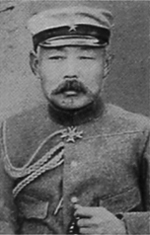Ijichi Kosuke
Baron Ijichi Kōsuke ( Japanese 伊 地 知 幸 介 ; * December 25, 1854 in Kagoshima , Japan ; † January 23, 1917 ) was a lieutenant general in the Imperial Japanese Army .
Life
Born in Kagoshima, Ijichi was the son of a samurai family. He graduated from the Imperial Japanese Army Academy in 1875 and then served in the Imperial Japanese Guard . In 1880 he was sent to France to undergo four years of training at the Saint-Cyr Military School . He then went to the German Reich for several years . At the beginning of the Sino-Japanese War , he was recalled to serve on the planning staff at the Imperial Headquarters . After the war he was sent to the United Kingdom as a military attaché from 1898 to 1900 .
On his return to Japan in 1900 he was promoted to major general and held various staff positions within the Imperial Japanese General Staff , mainly in the artillery division. In 1903 he was briefly on the staff of the Japanese embassy in Seoul , Korea . At the beginning of the Russo-Japanese War he was appointed Chief of Staff of the 3rd Army , which was involved in the operations against the Russian fortress of Port Arthur . The reason for this choice was Ijichi's many years of experience abroad, which made him an expert on current European military tactics. He was also considered an artillery expert and came from a different region than the Army Commander-in-Chief, Nogi Maresuke . This counterbalance was considered necessary because it was still not sure whether the loyalty of the individual generals was solely with the Tennō and not with the local power elite. Due to the long duration of the siege with no visible success and the rapidly increasing losses, Nogi and Ijichi clashed violently several times. However, the high command saw the fault mainly on Ijichi's side, as he repeatedly used the tactics of the human wave against the strongly fortified Russian positions. Marshal Yamagata Aritomo then openly advocated that Ijichi should be replaced by General Kodama Gentarō . Due to these circumstances, Nogi deposed him on his own initiative after the capture of Port Arthur and gave him a front line command within the army. After the Battle of Mukden , he succeeded in getting Ijichi ordered back to Japan, where he was given command of the coastal artillery in Tokyo Bay .
After the war, despite these incidents, Ijichi was promoted to lieutenant general and in 1907 raised to the rank of baron ( Danshaku ) in the Japanese nobility system ( Kazoku ) . Already at that time he tried for health reasons to submit his departure and to go into retirement, which he was refused. Instead he was given command of the 11th Division. It was not until 1913 that he was allowed to retire.
literature
- Richard Connaughton: The War of the Rising Sun and the Tumbling Bear - A Military History of the Russo-Japanese War 1904-5 , Cassell, London 1988, ISBN 0-415-00906-5 .
- Trevor N. Dupuy : Encyclopedia of Military Biography , IB Tauris & Co. Ltd., 1992, ISBN 1-850-43569-3 .
- Geoffrey Jukes: The Russo-Japanese War 1904-1905 , Osprey Publishing, 2002, ISBN 1-841-76446-9 .
Web links
Individual evidence
- ^ Jukes, The Russo-Japanese War. pp.59
| personal data | |
|---|---|
| SURNAME | Ijichi, Kosuke |
| ALTERNATIVE NAMES | 伊 地 知 幸 介 (Japanese) |
| BRIEF DESCRIPTION | Lieutenant General of the Imperial Japanese Army |
| DATE OF BIRTH | December 25, 1854 |
| PLACE OF BIRTH | Kagoshima , Japanese Empire |
| DATE OF DEATH | January 23, 1917 |
